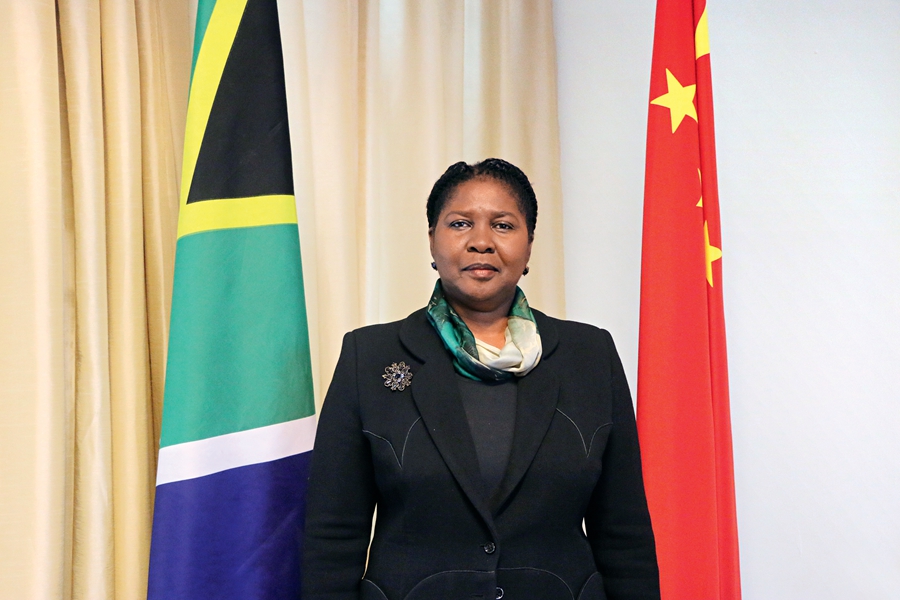By staff reporter ZHANG HUI
By staff reporter ZHANG HUI
RESPECTIVELY located in East Asia and the southernmost tip of Africa, China and South Africa, despite vast geographical distance between them, have witnessed increasingly close relations and fruitful cooperation since the establishment of their diplomatic relations in 1998. The two countries have increased their cooperation on international affairs via such platforms as the UN, the BRICS mechanism, G20, and the Forum on China-Africa Cooperation (FOCAC). While celebrating the 20th anniversary of bilateral diplomatic relations, China decided to convene the Beijing Summit of the FOCAC this year, responding to the widespread request of African countries, and South Africa will host the 10th BRICS Summit.
All these are providing new opportunities for the two countries to further boost their relations. Around this topic, China Today interviewed South African Ambassador to China Dolana Msimang and South Africa’s former Deputy Minister of International Relations and Cooperation Marius Fransman.
Twenty Years of Evolvement
After they established diplomatic relations, China and South Africa formed a partnership and set up a bi-national commission in 2000. The two sides later upgraded their relations to a strategic partnership in 2004, aiming for common development based on equality and mutual benefit. In August 2010, during the state visit of then South African President Jacob Zuma, heads of state of China and South Africa signed the declaration on establishing a comprehensive strategic partnership between the two countries, thus lifting their bilateral relations to a new level. In March 2013, during President Xi Jinping’s state visit to South Africa, the two sides released a joint communiqué to further boost their comprehensive strategic partnership.

South African Ambassador to China Dolana Msimang.
Ambassador Msimang attributed the constant upgrading of bilateral relations to the increasing political trust between the two countries and their ever increasing and closer economic exchanges. “This happened over time. It came about because of the depth of our relationship. Our political relations have become stronger and stronger, and our economic relationship has grown stronger too. Our robust bilateral economic exchanges have boosted our countries’ economies. This strategic partnership came up with things that have allowed us to achieve more than we ever could have before.” Msimang further emphasized that the depth of bilateral political relationship has enabled the two sides to cooperate even better on global issues.
On the first day of 2018, President Xi exchanged congratulatory messages with then President Zuma to mark the 20th anniversary of the establishment of bilateral diplomatic ties.
When talking about the anniversary at a celebration event in January in Beijing, Ambassador Msimang said: “I think it’s very important. We celebrate it because first, we’re celebrating with our true friend. Our friend is a friend in need and a friend we’ll continue to need. Although it has only been 20 years, we have achieved a lot. We started our relationship when my country faced development difficulties. The Chinese people helped us overcome those difficulties.”
Inexhaustible Impetus
China is South Africa’s biggest trade partner, and South Africa is China’s biggest trade partner and top investment and tourist destination in Africa. In 2016, bilateral trade volume reached US $35.344 billion, with Chinese export up to US $12.853 billion and import of US $22.491 billion, more than 20 times that in 1998 when the two countries started their diplomatic relations. China exports electric products, textile products, and metal wares to South Africa, and mainly imports mineral products.
Meanwhile, the two countries have seen their two-way investment consistently increase. At the end of 2016, the accumulated investment of China in South Africa exceeded US $13 billion, involving such fields as marine economy, mining, finance, manufacturing, and infrastructure; South Africa’s actual investment in China totaled US $660 million.
“I really want to thank the Chinese people. Had it not been for our robust bilateral relations, in particular the dynamic trade and economic exchanges, we would have had difficulties with economic issues,” South Africa’s former Deputy Minister of International Relations and Cooperation Marius Fransman told China Today. Fransman indicated that China’s development path set a great model for South Africa and other African countries.
Regarding the fields attracting foreign investment in South Africa, Fransman said, “The ocean economy is a sector of great development potential in South Africa, and has already attracted a huge amount of strategic investment. We intend to push forward China-South Africa cooperation in the ocean economy field under the framework of the Belt and Road Initiative.”

On December 3, 2015, the first day of President Xi’s visit to South Africa, the two heads of state witnessed the signing of 26 bilateral agreements and deals with the total value amounting to RMB 41.9 billion. During their talk, President Xi and President Zuma reached the consensus that the ocean economy, production capacity, energy, trade, and investment would be the priorities of cooperation in the future. The two sides also signed a memorandum of understanding on cooperation on the Belt and Road Initiative. Ambassador Msimang said, “The Belt and Road Initiative dovetails with South Africa’s New Development Plan (NDP) as well as Operation Phakisa, an initiative aimed at unlocking the potential of South Africa’s ocean economy.”
She continued, “As a government official, I have witnessed the development of bilateral trade and economic exchanges. As a citizen of South Africa, I think Chinese investment in the country is very important for us. We have seen the impressive progress China has made these years. Now China has become a major economy, and is going to be a world leader. So this serves as a great lesson for other countries to learn. If you follow these steps, maybe you’ll have a chance.”
The past several years have seen bilateral economic and trade exchanges further heightened. In March 2014, CNR Dalian Locomotive & Rolling Stock Co., Ltd. (now renamed CRRC Dalian Co., Ltd.) signed a contract to supply 232 locomotives to the South African state rail company Transnet, China’s biggest single locomotive export contract with a total value of US $900 million. Hisense, a Chinese home appliance manufacturer, which has a factory in South Africa, has become a household brand there. China’s state-run banks like Industrial and Commercial Bank of China, China Construction Bank, and Bank of China have all run businesses or established offices in Johannesburg. Huawei set up Africa’s first Information and Communications Technology (ICT) Innovation and Experience Center in South Africa in July 2016, and planned to cultivate 1,000 talents for the country in this field in five years. The center also provides a technology incubation platform for local small and medium-sized enterprises and open laboratories for several local universities.
According to Ambassador Msimang, a number of South African companies cutting across a variety of sectors from financial services, energy, and logistics to food and beverages, media, and mining have invested in China. They include Anglo American, Hollard Insurance, LandPac, Naspers, Old Mutual, SASOL, Standard Bank, and First Rand, to name a few.
New Opportunities
The 19th CPC National Congress, convened in October 2017, has not only been of great significance for China’s development, but also exerted far-flung influence on the international community. Ambassador Msimang said, “The outcome of the CPC national congress is very educating for us. I think it’s also very educating for the whole world. I read what people have commented and how people have followed what China was doing. I think this is closely associated with China’s opening-up policy. China’s opening-up has benefited the whole world, and China is sort of becoming a world leader. And so we all keep a close eye on the direction of China’s development.”
The ambassador also showed her endorsement to Xi’s proposal on building a community with a shared future for mankind. “My impression is China seeks to build an international community with a bright future together with other countries. The emphasis is sharing the destiny, which means that decisions must be beneficial to all. It has to be something that all of us agree on and look forward to. Therefore, if we share the same destiny, the world would become more integrated. This is really important when we have lots of disintegrations. It promises us a bright future,” she said.
The year 2018 features a range of multilateral and bilateral diplomatic activities in both China and South Africa. Responding to the wide call from African countries, China has decided to host a FOCAC summit this year. “I’m very happy that the seventh FOCAC ministerial gathering has upgraded into a summit. Because when you say it’s a summit, you have more expectations. The heads of state will attend, and we’re able to do a lot. The upgrading shows China’s seriousness on propelling the relationship between China and Africa. It also shows the importance and depth of Sino-Africa relations. I believe the summit is going to achieve a lot,” the ambassador said.
China successfully hosted the Ninth BRICS Summit in Xiamen in 2017. South Africa will take over the baton to host the BRICS Summit this year. Msimang said South Africa would ensure continuity of the BRICS summit mechanism and make further progress with new initiatives. “South Africa is pleased with the progress made in BRICS. In particular we are delighted to see that the African Regional Centre (ARC) of the BRICS-initiated New Development Bank (NDB) was launched in Johannesburg recently. The ARC will serve as a catalytic institution to fast-track the African continental infrastructure development programs,” she told China Today.
South Africa’s former Deputy Minister of International Relations and Cooperation Marius Fransman spoke highly of China’s fund injection into the NDB, which, in his view, has greatly contributed to the establishment and development of the bank. Fransman believes the NDB will help bring the infrastructure construction of its member countries to a new level. “What’s very important is that the NDB promotes the independent development of concerned countries in a sharing way,” he said.
Fransman believes the upcoming BRICS Summit will advance implementation of the existing cooperation projects, unveil new ones, and discuss challenges faced by member countries. He believes the summit will also lay out cooperation plans for the next 10 years of the BRICS mechanism.
Last April, Vice Premier Liu Yandong visited South Africa and started the China-South Africa High-Level People-to-People Exchange Mechanism (PPEM). Ambassador Msimang applauded the PPEM, “It helps lay a solid foundation for the two countries to further their exchanges in culture, education, health, sports, and tourism.” Late this year, Beijing will host the second conference of the PPEM.
The ambassador said, “Our relations have blossomed at all levels from trade and investment to education, science, culture, and media, and our political ties have become closer. Our solid ties not only provide a platform for South Africa to continue diplomatic engagement with one of our most important trade partners, but are also the key to broader engagement between our two countries, enabling the two sides to strengthen their relations on every front.” She looked forward to more fruitful results in bilateral cooperation in the future.